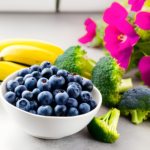

While this list provides a comprehensive overview of dog-friendly fruits and veggies, it's important to remember that just like people, some dogs might have sensitivities to certain foods. When introducing new fruits or vegetables, take it slow and observe your dog's reactions. Every pup is unique, and a gradual approach ensures that their digestive system adapts well to new treats. Your furry friend's well-being is paramount, so embrace the journey of discovering what suits them best!
Dog safe fruits and veggies, along with their key nutritional info:
Veggies:
- Beets: Folate, manganese, and fiber.
- Bell peppers: Vitamin C and antioxidants.
- Broccoli: Fiber, vitamin C, and folate.
- Brussels Sprouts: Fiber, vitamin K, and antioxidants.
- Cabbage: Vitamin K and antioxidants.
- Carrot: Beta-carotene and vitamin K.
- Celery: Hydration and some fiber.
- Cranberries: Antioxidants and vitamin C.
- Cucumbers: Hydration and a touch of vitamins.
- Green beans: Fiber and vitamin C.
- Pumpkin: Fiber, vitamin A, and antioxidants.
- Spinach: Iron, vitamin K, and folate.
- Squash: Vitamin A and potassium.
- Sweet potatoes: Beta-carotene and fiber.
For most dogs, incorporating fruits into their diet can be a healthy choice. Unlike many processed treats, fruits come with a range of benefits. They can boast antioxidant compounds like Vitamins A and C, carotenoids, and flavonoids, which are known to promote overall health and longevity.
Research indicates that an antioxidant-rich diet can support brain health in aging dogs. Additionally, fruits contribute to hydration due to their high water content.
Fruits contain more sugar than vegetables, underscoring the significance of moderation in your dog's diet.
When offering fruit to your pup, there are some additional considerations. Thoroughly washing the fruit before feeding is a must! Avoid giving them stems, pits, and seeds, some can be toxic.
Fruits:
- Apples: Fiber and vitamin C.
- Bananas: Potassium and vitamin B6.
- Blueberries: Antioxidants and vitamin K.
- Cantaloupe: Vitamin A and C, plus hydration.
- Mango: Vitamin C and vitamin A.
- Oranges: Vitamin C and hydration.
- Peaches: Vitamin C and dietary fiber.
- Pears: Fiber and vitamin C.
- Pineapple: Vitamin C and manganese.
- Raspberries: Fiber and antioxidants.
- Strawberries: Vitamin C and antioxidants.
- Watermelon: Hydration and a bit of vitamin C.
Remember, moderation is crucial. Ensure that all extras, whether they're fruits, veggies, or other treats, constitute no more than 10% of your dog’s daily caloric intake. This approach safeguards against potential nutritional imbalances. So go ahead and delve into these nutrient-rich choices, crafting delightful and nutritious meals for your furry companion!




